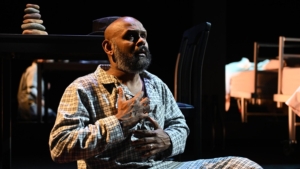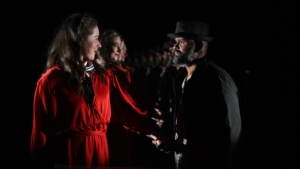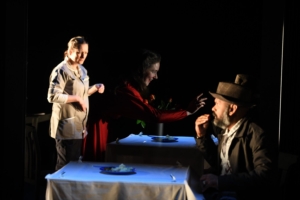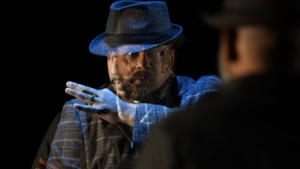With Ramesh Meyyappan, Love and Theatre Have No Limits
No Limits will present Love Beyond from 20 to 22 March at Sheung Wan Civic Centre. Written by Glasgow-based Singaporean theatre maker and actor Ramesh Meyyappan and directed by Matthew Lenton, Love Beyond is a visually creative show, incorporating British Sign Language (BSL), visual language and oral dialogue. Without subtitles, it intends to present an equal experience for both deaf and hearing audiences.
Love Beyond is a story of love, memories and human communication. Harry (Ramesh Meyyappan) has dementia. He also uses sign language. As he moves into a new home, he is accompanied by memories that dance like ghosts around him. Events from the past seem newly present. A visit from his wife rekindles their love – he imagines they are young and together again. Harry’s carer provides him with some solace, but just as the determined nurse begins to learn Harry’s sign language, he begins to forget it, leaving him in a unique world where he must confront the only thing that remains – himself.
We had the chance to chat with Meyyappan on a video call between Hong Kong and Glasgow, with the help of a British Sign Language translator. The artist shared his love for theatre with expressive gestures and a heartwarming smile.
Originally from Singapore, Meyyappan moved to Liverpool, UK, to complete his BA degree at the Liverpool Institute for Performing Arts. His journey is also one of love. In 2006, he moved to Glasgow for his Scottish wife, with the aim to make theatre accessible both to the deaf and hearing.
Being deaf has obviously impacted Meyyappan’s journey but theatre offered him a space of freedom. “One of the great things about theatre is that it is a space without limits where you can truly express exactly what you want to an audience,” he says. As a pioneer theatre maker, he has been creating stories with shared and universal themes transcending words, speaking to everyone. He invented a specific visual theatrical vocabulary for each piece of work, with an eclectic mix of visual and physical theatre styles to support the storytelling and the narrative. He sometimes also incorporates circus techniques, puppetry and illusion within his work.
Meyyappan is very involved in raising awareness of deaf community, deaf performers and directors. He designed the programme for the BA Performance in BSL and English at the Royal Conservatoire in Scotland where he continues to teach the Visual Theatre module. “I want to inspire young deaf people. I want them to have more role models, so they believe they can,” he says.
His latest play Love Beyond incorporates British Sign Language (BSL), visual language and oral dialogue. The absence of subtitles is an artistic choice intended to present an equal experience for deaf and hearing audiences, but also applying to different ethnicities, languages and cultures.
“I worked with Matthew Lenton (director of the play), like two souls who had mutual understanding of visual language. I used a mixed cast of deaf and hearing to show mutual respect across cultures. The two hearing actors didn’t know sign language. I wanted them to experience the incomprehension of the characters. They were on a learning journey as well,” he explains.
Harry is signing and his caregiver cannot understand him. They’re both facing incomprehension. Meyyappan wanted the audience to experience the incomprehension and frustration, from an hearing or deaf perspective, and to empathise with the characters. “It’s about giving a rich experience to the audience, whether you are deaf or hearing, because you would experience either side of those two reactions. I want the audience to experience the frustration and the barrier of not understanding the full communication,” he says.
If there were subtitles, the audience would miss the theatre experience and Harry’s journey when looking up for the subtitles. “Without any subtitles, you connect with the humanness of the story. You really empathise and connect with the emotion of the story. So, I just ask the audience to sit in and pay attention, and the story will unfold before their eyes,” he says with a smile.
The play director Matthew Lenton (who is hearing) is going further by explaining to us that it is not important to understand the literal meaning of the words: “It’s our intention that the visual and ‘musical/tonal’ journey is the important one. The words themselves are often banal. There is such an anxiety about ‘understanding’ things, as if we can and should understand everything. For me, it’s not important, not desirable, to ‘fully understand’ a performance. In fact, for me, the best art is art that we don’t fully understand. Because it moves or affects us in a different, deeper, perhaps dreamlike way. Words can often tie things down, words make things literal, narrow meaning. I hope the audience will accept that the artists are making a very particular invitation to them, to engage with the show in a certain way”.
Meyyapan came to Hong Kong many years ago, but this is the first time that he comes to present his work. “I’m very excited. I hope I’m presenting a human story and that the audience will follow the journey of this deaf man who has dementia and that it will inspire them to communicate, to connect and to come together,” he concludes with an heartwarming smile and shiny eyes.
More details about the performances and No Limits 2025 can be found here:



